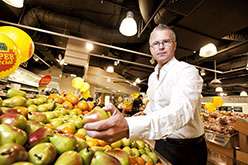Dr Gary Mortimer
It's the sense of connectedness with the community and the desire to help the local economy that is motivating people to buy locally grown and made products, more so than environmental or health concerns, a major QUT study has found.
Dr Gary Mortimer from QUT Business School researched the rise in demand for food produced locally in the face of a growing push to 'buy local' by governments, interest groups and communities.
"Consumers are becoming more active in choosing alternative channels to purchase locally grown and produced foods which we can see in the growth of farmers' markets, roadside stalls and community gardens," Dr Mortimer said.
Dr Mortimer said most of the shoppers surveyed defined 'local' to be food products sourced within their region, town or city, with an aesthetically authentic, rustic, artisan or home-made look.
"Consumers expect to see higher proportions of 'local' food in categories such as bakery, eggs, fresh fruit and vegetables, and to a lesser extent, dairy and meat."
He said supermarkets and grocers were responding by tailoring their ranges to include local foods and unique products to meet their customers' changing needs. Internationally, grocery giants like Asda (UK) and Wal-mart (US) have reported significant sales increases in 'local' food.
"More than 80 percent of shoppers indicated they would buy 'local' foods and products if they were readily available in supermarkets," Dr Mortimer said.
"But only about 20 per cent of consumers believe major supermarkets currently provide a good range of 'local' food products, and this suggests opportunities for increasing awareness and promotional campaigns."
He said that shoppers also said they bought 'local' food because they thought it was of high quality and safe.
"The cost and convenience factors are less important when it comes to local food.
"International research also suggests people are willing to pay more for locally produced and grown products, and this will be a further area of my research."
Dr Mortimer presented his research to one of Australia's largest supermarket retailers.
"Consumers want both government and major supermarkets to do more for the farming community and the promotion of local produce.
"This research suggests that supermarkets should engage with all levels of government and other industry groups to develop programs around sourcing, funding and consumer education."
Provided by Queensland University of Technology





















